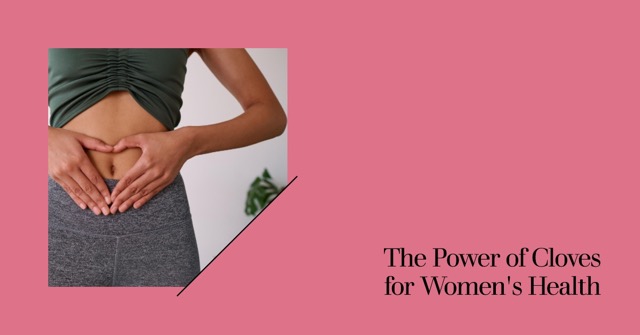There is some concern regarding potential side effects of cloves on the virgina (Vagina).
In this post, we will examine the potential side effects when cloves are applied to the vaginal area, what causes them and how to reduce or avoid some of these side effects.
But first of all ...

What are cloves?
Cloves originate from the dried flower buds of a tree native to Indonesia, scientifically known as Syzygium aromaticum. They have a robust, sweet aroma and flavor.
Clove is a popular ingredient found in many cuisines globally. They are often used whole in curries, stews, roasted meats, and baked goods. Ground cloves are also typical in spice combinations and can add flavor to breads, soups, desserts, and more.
For thousands of years, both Ayurvedic and Chinese medicine have utilized cloves. Some medicinal applications include:
- Alleviating pain - The compound eugenol in cloves has natural pain-relieving qualities. Cloves may treat headaches, joint discomfort, and toothaches.
- Anti-inflammatory - Eugenol also possesses anti-inflammatory properties to reduce swelling. This can help conditions like arthritis and gout.
- Antioxidant - Cloves contain antioxidants to safeguard cells from damage. This may provide anti-aging effects.
- Digestive aid - Cloves can promote digestion by stimulating gastric juice production. This assists with upset stomach, nausea, and flatulence.
There are more benefits and uses of clove, which you can read more about Here
How are cloves used on the vagina?
Cloves are occasionally applied to the vaginal area as a treatment for various conditions, such as:
- Vaginal infections - The antimicrobial traits of cloves may combat bacterial and yeast infections when used topically. Eugenol in cloves could eliminate pathogens causing infection.
- Yeast infections - Cloves may be specifically helpful for treating vaginal yeast infections due to their effects against fungi. Some women use clove oil suppositories to treat vaginal candidiasis.
- Bacterial vaginosis - Some research indicates cloves may be effective at killing bacteria like Gardnerella vaginalis and Atopobium vaginae which are involved in bacterial vaginosis.
- Itching - The numbing effects of cloves may help provide relief from vaginal itching caused by infections or inflammation. The anti-inflammatory effects help reduce swelling and irritation as well.
- Burning - Cloves can temporarily numb nerve endings in the skin, which may help provide relief from burning sensations. Some women use clove oil to help with burning during urination.
To use cloves on the vagina, women may:
- Insert a clove bud internally overnight
- Apply a diluted clove oil solution to the outer vaginal area
- Use a clove suppository vaginally
Cloves should always be diluted and used with caution on vaginal tissues.
What are the potential side effects of cloves on the vagina?
The potential side effects of cloves on the vagina include:
- Burning - While cloves may relieve vaginal burning in some cases, applying cloves directly can cause a burning sensation. Diluting clove oil can help avoid this.
- Itching - Some women may experience itching after using cloves, possibly due to mild irritation or an allergic reaction.
- Swelling - Cloves may cause irritation and inflammation of vaginal tissue in some women, resulting in swelling.
- Pain - In some cases, cloves may actually increase vaginal pain rather than relieve it. Using overly concentrated clove solutions can damage sensitive tissue.
- Allergic reaction - Some women may be allergic to cloves and experience symptoms like rash, itching, and swelling. Clove allergies can develop after repeated use.
Other potential side effects of cloves include:
- Skin damage - Concentrated clove oil can cause skin burns. This can allow infection to develop.
- Hormonal effects - Some research indicates cloves may have estrogenic and anti-estrogenic effects by mimicking or blocking estrogen. This could affect menstruation and fertility.
- Toxicity - Consuming extremely high doses of cloves orally can lead to liver damage and other toxic effects. However, this would not occur from vaginal application.
Pregnant women should avoid using cloves internally as it may stimulate the uterus.
For most women, using diluted cloves externally and avoiding overuse reduces the risk of side effects. But those with sensitivities may still experience issues like burning, itching, and swelling.
How to avoid side effects of cloves on the vagina
To avoid side effects of cloves on the vagina, it is important to:
- Use cloves in moderation.
- Limit clove use to 5-7 days at a time
- Give your body a break between uses
- Use the minimum effective dose
- Dilute cloves with water or another liquid before applying them to the vagina
- Dilute with water, coconut oil, olive oil, or yogurt
- Start with 50% clove oil, 50% diluent
- Test on a small area first to check for burning before applying to the vagina
- Avoid using cloves if you have a history of allergies
- Allergic reactions are more common if you have sensitivities
- Check for clove allergy by rubbing diluted clove oil on inner arm
- Stop using if rash, itching, or redness develops
- Never use cloves during pregnancy
- Can stimulate uterus and lead to complications
- Check with your doctor before use while breastfeeding
- Talk to your doctor before use if taking medication
- Eugenol may interact with blood thinners and other drugs
- Disclose use to healthcare providers to monitor for interactions
- Use good hygiene practices
- Properly sanitize and clean clove solutions
- Avoid contamination that could introduce new infection
- Stop use if irritation, burning or pain develops
- Signs of sensitivity or side effects
- Switch to a soothing natural remedy like aloe vera
- See your doctor if symptoms persist
Being aware of proper usage and dilution, as well as your own sensitivities, can help minimize the side effects of using cloves vaginally.
Bottom Line on side effects of cloves on the
Virgina/vagina
If used properly, many women can take advantage of the antimicrobial and anti-inflammatory properties of cloves without issue. But improper or overuse of cloves can lead to side effects like burning, stinging, itching, swelling, skin damage, and allergic reactions in some cases.
If you experience any side effects from using cloves on the vagina, discontinue use and talk to your doctor. They can provide guidance on alternative therapies. While cloves show promise for treating certain vaginal problems, approach their use with caution and care.
FAQ
What are the benefits of using cloves on the vagina?
Some potential benefits of using cloves on the vagina include helping treat bacterial and yeast infections, reducing vaginal itching and inflammation, and alleviating pain and burning sensations. The antimicrobial and numbing properties of cloves may provide symptom relief.
How should I apply cloves to the vagina?
It's best to dilute cloves in a carrier oil or liquid before applying them to the vagina. Start with a 50/50 mixture of clove oil and a diluent like coconut oil or yogurt. Apply a small amount externally first to test for any burning before using internally. Never apply undiluted clove oil directly as it can damage skin.
What's the recommended dosage and duration for using cloves vaginally?
Limit vaginal use of diluted cloves to 5-7 days at a time, then take a break before using again. Use the minimum amount needed to get symptom relief. Do not exceed more than 1-2 weeks of continual use due to the potential for side effects.
Can I use cloves if I'm pregnant or breastfeeding?
Do not use cloves internally if pregnant or breastfeeding. Cloves may stimulate uterine contractions in pregnancy. Discuss use of cloves on the vagina with your doctor first if nursing.
Are there any side effects or risks associated with vaginal cloves?
Potential side effects include burning, stinging, itching, irritation, swelling, allergic reactions, and skin damage if applied undiluted. Stop use if any of these occur. People with multiple allergies or sensitive skin may be more prone to reactions.
Can cloves interact with any medications I'm taking?
Yes, the eugenol in cloves can potentially interact with certain medications like blood thinners and NSAIDs. Let your doctor know if using cloves to monitor for any interactions with medications you take.
Is it safe to use cloves long-term on the vagina?
Prolonged, frequent use of cloves on the vagina is not recommended. Use cloves only for short periods of 5-7 days with breaks in between due to the potential for irritation, allergic reactions, and other side effects from overuse.
References
[1] "Cloves." WebMD, WebMD, 2023, https://www.webmd.com/diet/health-benefits-cloves.
[2] "Cloves: Uses, Side Effects, Interactions, Dosage, and Warning." Healthline, Healthline Media, 2023, https://www.healthline.com/nutrition/benefits-of-cloves
[3] "Cloves." The University of Maryland Medical Center, The University of Maryland Medical Center, 2023, https://www.umms.org/ummc
Additional resources
[1] "Cloves: Health Benefits, Side Effects, and How to Use." Medical News Today, MediLexicon International, 2023, https://www.medicalnewstoday.com/articles/320768.
[2] "Cloves: Uses, Side Effects, Interactions, Dosage, and Warning." Drugs.com, Drugs.com, 2023, https://www.drugs.com/mtm/clove.html
